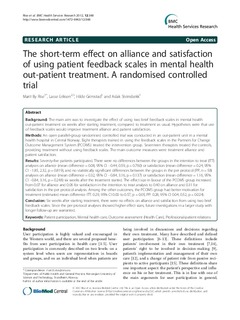| dc.description.abstract | Background: The main aim was to investigate the effect of using two brief feedback scales in mental health
out-patient treatment six weeks after starting treatment, compared to treatment as usual. Hypotheses were that use
of feedback scales would improve treatment alliance and patient satisfaction.
Methods: An open parallel-group randomised controlled trial was conducted in an out-patient unit in a mental
health hospital in Central Norway. Eight therapists trained in using the feedback scales in the Partners for Change
Outcome Management System (PCOMS) treated the intervention group. Seventeen therapists treated the controls,
providing treatment without using feedback scales. The main outcome measures were treatment alliance and
patient satisfaction.
Results: Seventy-five patients participated. There were no differences between the groups in the intention to treat (ITT)
analyses on alliance (mean difference = 0.08, 95% CI −0.44, 0.59, p = 0.760) or satisfaction (mean difference = 0.24, 95%
CI −1.85, 2.32, p = 0.819), and no statistically significant differences between the groups in the per protocol (PP, n = 58)
analyses on alliance (mean difference = 0.32, 95% CI −0.84, 3.16, p = 0.137) or satisfaction (mean difference = 1.16, 95%
CI −0.84, 3.16, p = 0.248) six weeks after the treatment started. The effect size in favour of the PCOMS group increased
from 0.07 for alliance and 0.06 for satisfaction in the intention to treat analysis to 0.40 on alliance and 0.31 for
satisfaction in the per protocol analysis. Among the other outcomes, the PCOMS group had better motivation for
treatment (estimated mean difference ITT: 0.29, 95% CI 0.00 to 0.57, p = 0.05, PP: 0.28, 95% CI 0.04, 0.52, p = 0.024).
Conclusion: Six weeks after starting treatment, there were no effects on alliance and satisfaction from using two brief
feedback scales. Since the per protocol analyses showed higher effect sizes, future investigations in a larger study with
longer follow-up are warranted.
Keywords: Patient participation, Mental health care, Outcome assessment (Health Care), Professional-patient relations. | nb_NO |
